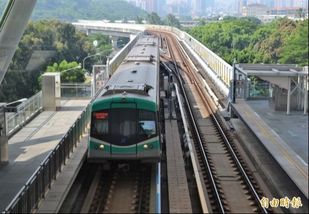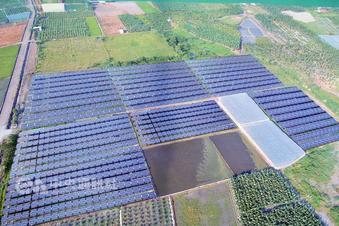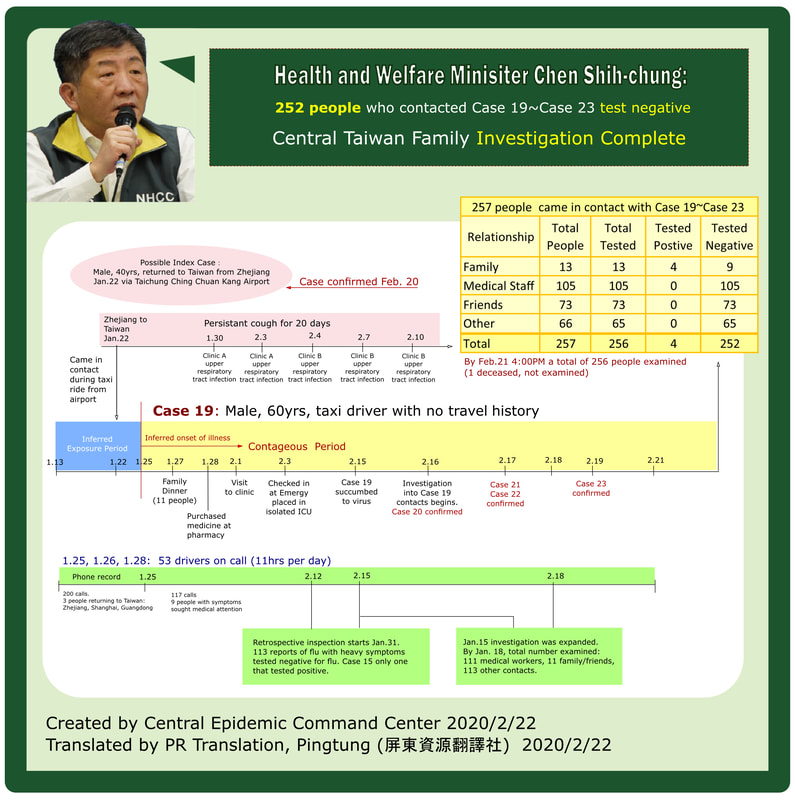|
The Minister of Health and Welfare, Chen Shih-chung, has announced that the investigation into those who came in contact with Coronavirus (COVID-19) Case 19~Case 23 in Central Taiwan is complete and 252 out of the 256 tested return negative results.
Based on the investigation, it was inferred that "Case 19", a 60 year old, male taxi driver with no travel history was exposed to the virus between February 13th and 25th. Evidently, by January 28th, the taxi driver felt the need to purchased medicine at a pharmacy to address the symptoms he was experiencing. By February 1st, he made his first visit to a clinic and two days later was in the emergency room at a local hospital from where he was placed into isolated ICU. By February 15, approximately two weeks later, the 60 year old had succumbed to the virus. An outline of the investigation was provided by the Central Epidemic Command Center. The following is a translation of it provided by PR Translation:
1 Comment
 From Focus Taiwan Taipei, Nov. 10 (CNA) The government has begun reviewing its immigration policy related to professional talent and migrant workers to address the shortage of skilled workers and manpower, Minister without Portfolio Lin Wan-i (林萬億) said Friday. Most immigrants move to Taiwan through marriage or as dependent relatives because Taiwan maintains a relatively strict immigration policy, Lin said at a press conference at which the government outlined its approach to deal with workforce shortage issues. "In view of the lack of professional talent and manpower in specific sectors, such as agriculture, fishing, and the long-term health care sector, the idea of having foreign nationals work in Taiwan and reside here permanently is being floated," Lin said. Premier Lai Ching-te (賴清德) pledged that the government will present policies aimed at creating an "immigrant-friendly" environment. Officials stressed at the press event that a shortage of workers remains a problem in Taiwan, and it could imperil its economic growth. According to Deputy Labor Minister Liao Huei-fang (廖蕙芳), Taiwan had a shortage of 233,000 workers at the end of February, translating to a job vacancy rate of 3.01 percent. "The job vacancy rate has been on the rise since 2015. The manufacturing sector had the biggest shortfall of 88,000 at the end of February and has been deeply troubled by the problem," she said. As for professional talent, Kao Shien-quey (高仙桂), the deputy head of the National Development Council, said 73 percent of 1,005 employers polled in Taiwan felt that finding skilled talent in Taiwan was difficult, citing a ManpowerGroup survey. Cabinet officials did not make any specific proposals on Friday to reform immigration policy, but Lai said the policy is to be reviewed. "We can't talk about attracting talent from abroad without looking at our immigration policy," he said. Full Article  In order to push forward plans to extend the Kaohsiung Mass Rapid Transit (KMRT) into Pingtung, the Kaohsiung City and Pingtung County governments have formed a preparatory working group to prioritize the decision on the routing for the extension. The plan to extend the Kaohsiung MRT into Pingtung is already listed among first phase special budgets for “forward looking projects”, with allocations totaling 50 million NTD designated for the conducting of feasibility research, comprehensive planning and environmental assessment work. The Kaohsiung City government, which is responsible for execution, expects the preliminary work to be complete by the end of 2019. The working group for the KMRT extension project, established by the Kaohsiung City and Pingtung County governments, will convene periodically to deliberate the preferred routing. While answering inquiries at the Legislative Yuan, Transportation Minister Hochen Tan revealed that there were difficulties associated with extending the red line of the KMRT into Donggang and that priority would be given to evaluating the extension of the orange line into Pingtung City. However, a Kaohsiung City government official pointed that nothing has actually been hammered out regarding which line will be extended into Pingtung. Further discussions between Kaohsiung and Pingtung governments still need to take place to ensure that the development of the towns and cities and traffic considerations are taken into account. PR Translation - Translated from Liberty Times article: http://news.ltn.com.tw/news/life/breakingnews/2245828  In Linbian Township (Pingtung), the Council of Agriculture has designated a 495 hectare (1223 acre) property, which partially overlaps cultivation land, as an "unfavorable farming zone” so that it can be used for green energy development. However, director of the county government’s Promotion Office of Green Energy, Ho Shao-Kang, believes that since the local government has a better understanding of the current conditions of the land, such zoning should be initiated by local governments. The 495 hectares “unfavorable farming zone” marked off by the Council of Agriculture (Executive Yuan) in Linbian is the first of its type – and the fact that it overlaps with a designated cultivation zone has caused uncertainty among local residents who wonder if they will be able to continue their work after the rezoning. One local cultivator, surnamed Chen, expressed his desire to keep cultivating, saying that he isn’t interested in getting into green energy. Meanwhile, in the subsidence zone of the neighboring township of Jiadong, there are many residents hoping for an “unfavorable farming zone” designation. DPP legislator, Su Chen-ching, points out that there is plenty of land in Jiadong which is unsuitable for farming as a result subsidence, but there have been no notices designating these areas as unfavorable farming zones. Local residents have also reacted, expressing their desire to apply for photoelectric business projects, but they don’t know what the conditions are that need to be met for approval. Clearly there is a need for a positive listing. Ho Shao-Kang explained that the zoning for unfavorable farming does not necessitate the land be used for green energy. It just means that the owners of the land have one more option. It is his opinion, however, that it would be more appropriate if the local governments first draw out the “unfavorable farming zones” and then petition the Council of Agriculture for ratification. After all, the local governments have a better understanding of which plots of land are suitable for such zoning, with knowledge on the current conditions of the land, Taiwan Power Company’s capability of hooking up feeder cables to the grid, the county government’s land planning and usage, and the attitudes of locals. These all need to be accounted for if one hopes to increase chances of success. Ho Shao-Kang said that, currently, the unfavorable farmland in the country is universally not being developed. Pingtung has over 4000 hectares of subsidence zones and at this time the Council of Agriculture has only designated 495 hectares of unfavorable land – this is well behind the progress schedule that the county government has planned out for green energy. Translation from CNA news article: http://www.cna.com.tw/news/aloc/201711060191-1.aspx |
AuthorPR Translation & Media ArchivesCategories |
Proudly powered by Weebly


 RSS Feed
RSS Feed